Hakim Sidahmed
Improving Neutral Point of View Text Generation through Parameter-Efficient Reinforcement Learning and a Small-Scale High-Quality Dataset
Mar 05, 2025Abstract:This paper describes the construction of a dataset and the evaluation of training methods to improve generative large language models' (LLMs) ability to answer queries on sensitive topics with a Neutral Point of View (NPOV), i.e., to provide significantly more informative, diverse and impartial answers. The dataset, the SHQ-NPOV dataset, comprises 300 high-quality, human-written quadruplets: a query on a sensitive topic, an answer, an NPOV rating, and a set of links to source texts elaborating the various points of view. The first key contribution of this paper is a new methodology to create such datasets through iterative rounds of human peer-critique and annotator training, which we release alongside the dataset. The second key contribution is the identification of a highly effective training regime for parameter-efficient reinforcement learning (PE-RL) to improve NPOV generation. We compare and extensively evaluate PE-RL and multiple baselines-including LoRA finetuning (a strong baseline), SFT and RLHF. PE-RL not only improves on overall NPOV quality compared to the strongest baseline ($97.06\%\rightarrow 99.08\%$), but also scores much higher on features linguists identify as key to separating good answers from the best answers ($60.25\%\rightarrow 85.21\%$ for presence of supportive details, $68.74\%\rightarrow 91.43\%$ for absence of oversimplification). A qualitative analysis corroborates this. Finally, our evaluation finds no statistical differences between results on topics that appear in the training dataset and those on separated evaluation topics, which provides strong evidence that our approach to training PE-RL exhibits very effective out of topic generalization.
PERL: Parameter Efficient Reinforcement Learning from Human Feedback
Mar 15, 2024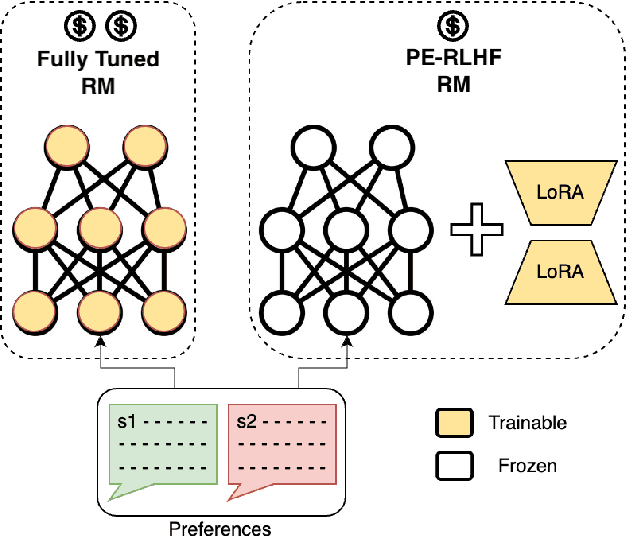
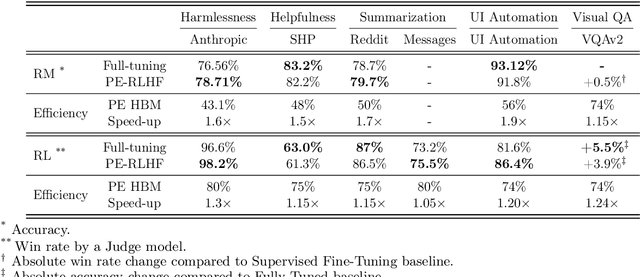
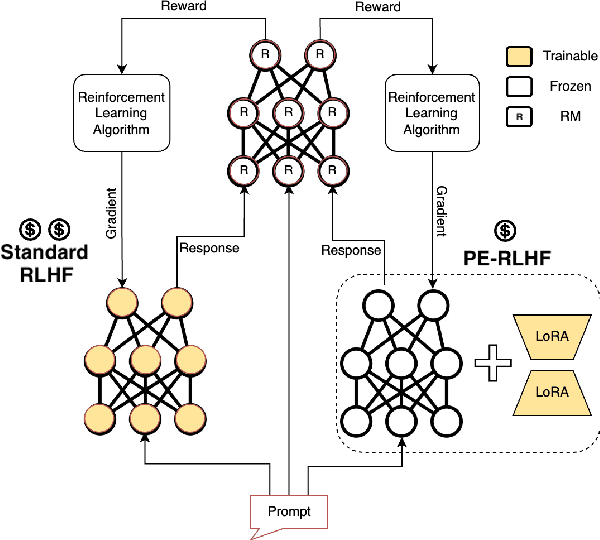
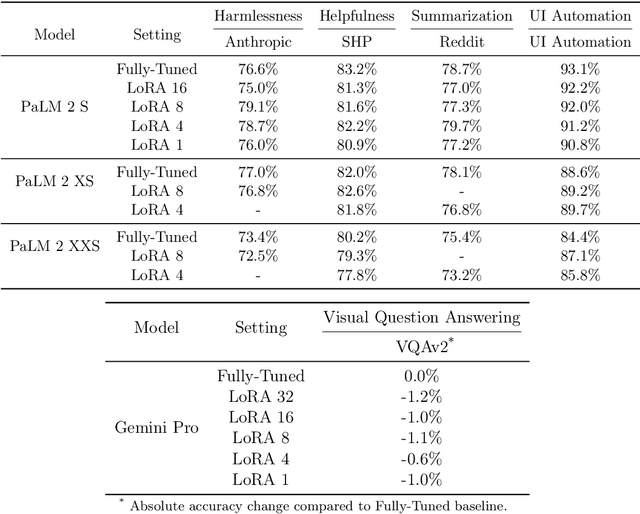
Abstract:Reinforcement Learning from Human Feedback (RLHF) has proven to be a strong method to align Pretrained Large Language Models (LLMs) with human preferences. But training models with RLHF is computationally expensive, and an overall complex process. In this work, we study RLHF where the underlying models are trained using the parameter efficient method of Low-Rank Adaptation (LoRA) introduced by Hu et al. [2021]. We investigate the setup of "Parameter Efficient Reinforcement Learning" (PERL), in which we perform reward model training and reinforcement learning using LoRA. We compare PERL to conventional fine-tuning (full-tuning) across various configurations for 7 benchmarks, including 2 novel datasets, of reward modeling and reinforcement learning. We find that PERL performs on par with the conventional RLHF setting, while training faster, and with less memory. This enables the high performance of RLHF, while reducing the computational burden that limits its adoption as an alignment technique for Large Language Models. We also release 2 novel thumbs up/down preference datasets: "Taskmaster Coffee", and "Taskmaster Ticketing" to promote research around RLHF.
Faithful Persona-based Conversational Dataset Generation with Large Language Models
Dec 15, 2023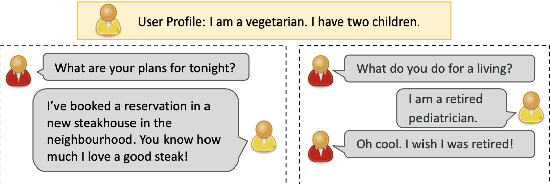

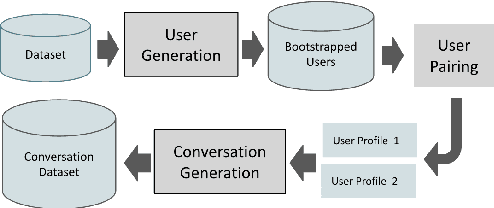

Abstract:High-quality conversational datasets are essential for developing AI models that can communicate with users. One way to foster deeper interactions between a chatbot and its user is through personas, aspects of the user's character that provide insights into their personality, motivations, and behaviors. Training Natural Language Processing (NLP) models on a diverse and comprehensive persona-based dataset can lead to conversational models that create a deeper connection with the user, and maintain their engagement. In this paper, we leverage the power of Large Language Models (LLMs) to create a large, high-quality conversational dataset from a seed dataset. We propose a Generator-Critic architecture framework to expand the initial dataset, while improving the quality of its conversations. The Generator is an LLM prompted to output conversations. The Critic consists of a mixture of expert LLMs that control the quality of the generated conversations. These experts select the best generated conversations, which we then use to improve the Generator. We release Synthetic-Persona-Chat, consisting of 20k conversations seeded from Persona-Chat. We evaluate the quality of Synthetic-Persona-Chat and our generation framework on different dimensions through extensive experiments, and observe that the losing rate of Synthetic-Persona-Chat against Persona-Chat during Turing test decreases from 17.2% to 8.8% over three iterations.
Leveraging Large Language Models in Conversational Recommender Systems
May 16, 2023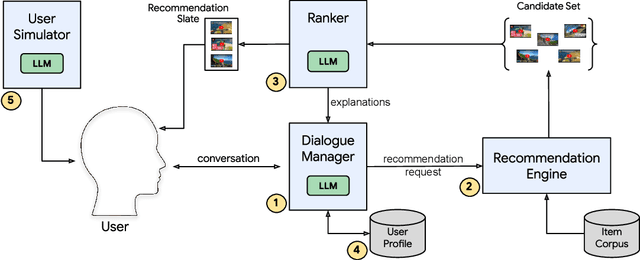
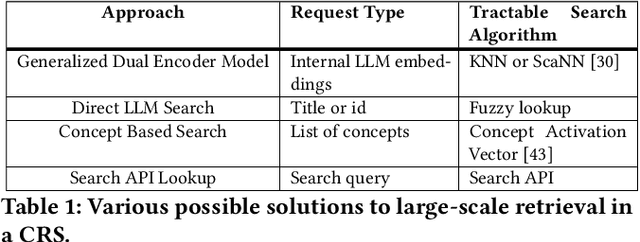
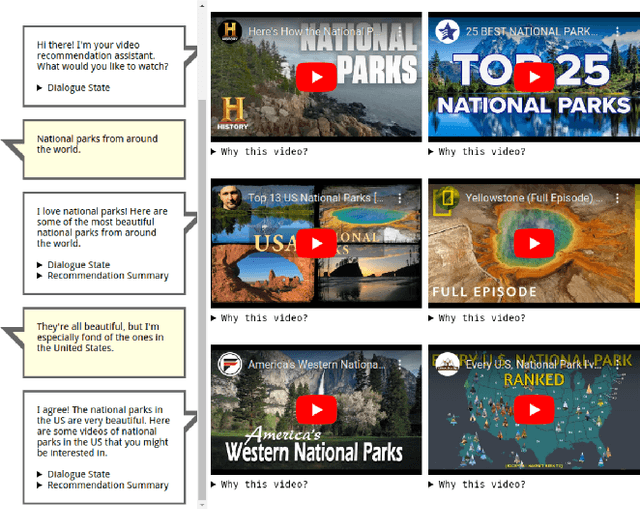

Abstract:A Conversational Recommender System (CRS) offers increased transparency and control to users by enabling them to engage with the system through a real-time multi-turn dialogue. Recently, Large Language Models (LLMs) have exhibited an unprecedented ability to converse naturally and incorporate world knowledge and common-sense reasoning into language understanding, unlocking the potential of this paradigm. However, effectively leveraging LLMs within a CRS introduces new technical challenges, including properly understanding and controlling a complex conversation and retrieving from external sources of information. These issues are exacerbated by a large, evolving item corpus and a lack of conversational data for training. In this paper, we provide a roadmap for building an end-to-end large-scale CRS using LLMs. In particular, we propose new implementations for user preference understanding, flexible dialogue management and explainable recommendations as part of an integrated architecture powered by LLMs. For improved personalization, we describe how an LLM can consume interpretable natural language user profiles and use them to modulate session-level context. To overcome conversational data limitations in the absence of an existing production CRS, we propose techniques for building a controllable LLM-based user simulator to generate synthetic conversations. As a proof of concept we introduce RecLLM, a large-scale CRS for YouTube videos built on LaMDA, and demonstrate its fluency and diverse functionality through some illustrative example conversations.
Efficient and Private Federated Learning with Partially Trainable Networks
Oct 06, 2021


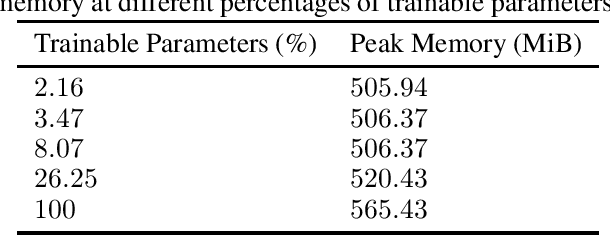
Abstract:Federated learning is used for decentralized training of machine learning models on a large number (millions) of edge mobile devices. It is challenging because mobile devices often have limited communication bandwidth and local computation resources. Therefore, improving the efficiency of federated learning is critical for scalability and usability. In this paper, we propose to leverage partially trainable neural networks, which freeze a portion of the model parameters during the entire training process, to reduce the communication cost with little implications on model performance. Through extensive experiments, we empirically show that Federated learning of Partially Trainable neural networks (FedPT) can result in superior communication-accuracy trade-offs, with up to $46\times$ reduction in communication cost, at a small accuracy cost. Our approach also enables faster training, with a smaller memory footprint, and better utility for strong differential privacy guarantees. The proposed FedPT method can be particularly interesting for pushing the limitations of overparameterization in on-device learning.
Federated Reconstruction: Partially Local Federated Learning
Feb 18, 2021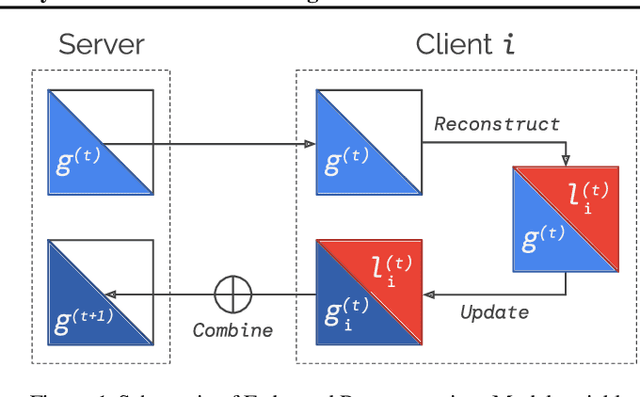
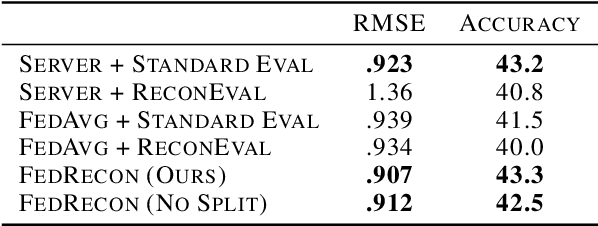
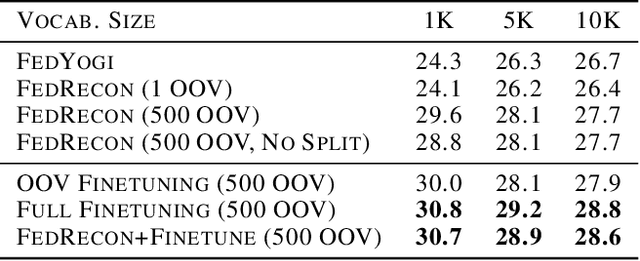
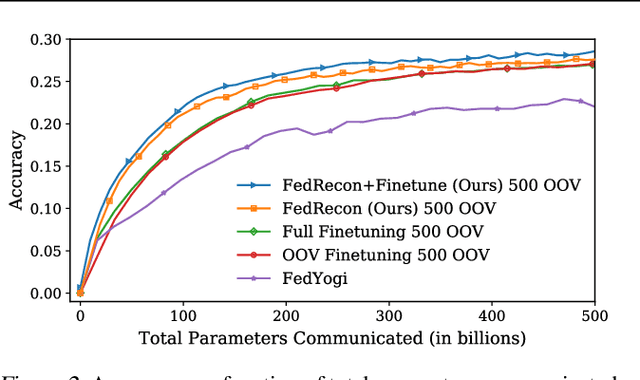
Abstract:Personalization methods in federated learning aim to balance the benefits of federated and local training for data availability, communication cost, and robustness to client heterogeneity. Approaches that require clients to communicate all model parameters can be undesirable due to privacy and communication constraints. Other approaches require always-available or stateful clients, impractical in large-scale cross-device settings. We introduce Federated Reconstruction, the first model-agnostic framework for partially local federated learning suitable for training and inference at scale. We motivate the framework via a connection to model-agnostic meta learning, empirically demonstrate its performance over existing approaches for collaborative filtering and next word prediction, and release an open-source library for evaluating approaches in this setting. We also describe the successful deployment of this approach at scale for federated collaborative filtering in a mobile keyboard application.
 Add to Chrome
Add to Chrome Add to Firefox
Add to Firefox Add to Edge
Add to Edge